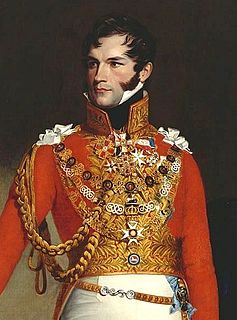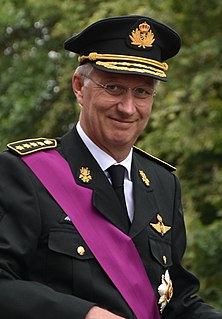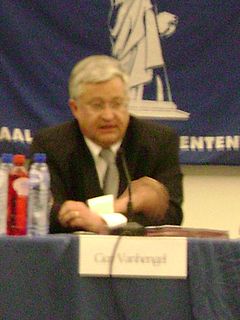
Leopold I was a German prince who became the first King of the Belgians following the country's independence in 1830. He reigned between July 1831 and December 1865.

Leopold III reigned as the King of the Belgians from 1934 until 1951, when he abdicated in favour of the heir apparent, his son Baudouin. From 1944 until 1950, Leopold's brother, Charles, served as prince regent while Leopold was declared unable to reign. Leopold's controversial actions during the Second World War resulted in a political crisis known as the Royal Question. In 1950, the debate about whether Leopold could resume his royal functions escalated. Following a referendum, Leopold was allowed to return from exile to Belgium, but the continuing political instability pressured him to abdicate in 1951.

Guy Maurice Marie Louise Verhofstadt is a Belgian politician who has served as the Leader of the Alliance of Liberals and Democrats for Europe and a Member of the European Parliament (MEP) from Belgium since 2009. He served as the 47th Prime Minister of Belgium from 1999 to 2008, Deputy Prime Minister of Belgium from 1985 to 1992 and Minister of Budget from 1985 to 1992. He was a Member of the Chamber of Representatives from 1985 to 2009.

Philippe or Filip is the King of the Belgians, having ascended the throne on 21 July 2013, following his father's abdication. He is the eldest child of King Albert II, whom he succeeded upon Albert's abdication for health reasons, and Queen Paola. He married Countess Mathilde d'Udekem d'Acoz, with whom he has four children. King Philippe's elder daughter, Princess Elisabeth, is first in the line of succession.
The Liberal Reformist Party was a liberal political party active in the Walloon Region and Brussels in Belgium. The PRL grew out of the Francophone part of the unitary liberal Party for Freedom and Progress (PVV-PLP) in 1971, and merged into the Reformist Movement (RM) in 2002.

DéFI is a social-liberal, liberal, regionalist political party in Belgium mainly known for defending French-speakers’ interests in and near the Brussels region. The party is led since 1995 by Olivier Maingain, a member of the Chamber of Representatives. The party's current name, DéFI or Défi, is a backronym of Démocrate, Fédéraliste, Indépendant meaning "challenge" in French which was adopted in 2016.

Louis Hortense Omer Charles Michel is a Belgian politician. He served in the government of Belgium as Minister of Foreign Affairs from 1999 to 2004 and was European Commissioner for Development and Humanitarian Aid from 2004 to 2009. Since 2009, he has been a Member of the European Parliament. Michel is a prominent member of the French-speaking liberal party, the Mouvement Réformateur. He is the father of Charles Michel, the current Prime Minister of Belgium.

The Belgian Revolution was the conflict which led to the secession of the southern provinces from the United Kingdom of the Netherlands and the establishment of an independent Kingdom of Belgium.

Jean Louis Joseph Lebeau was a Belgian liberal statesman, the second Prime Minister.

Jean Joseph Camille Huysmans was a Belgian politician.

Hubert Marie Eugène Pierlot was a Belgian politician and 32nd Prime Minister of Belgium, serving between 1939 and 1945. Pierlot, a lawyer and jurist, served in World War I before entering politics in the 1920s. A member of the Catholic Party, Pierlot became Prime Minister in 1939, shortly before Belgium entered World War II. In this capacity, he headed the Belgian government in exile, first from France and later Britain, while Belgium was under German occupation. During the German invasion of Belgium in May 1940, a violent disagreement broke out between Pierlot and King Leopold III over whether the King should follow the orders of his ministers and go into exile or surrender to the German Army. Pierlot considered Leopold's subsequent surrender a breach of the Constitution and encouraged the parliament to declare Leopold unfit to reign. The confrontation provoked a lasting animosity between Pierlot and other conservatives, who supported the King's position and considered the government's exile to be cowardly.

The term State reform in the Belgian context refers to the ongoing process of seeking and finding constitutional and legal solutions to the problems and tensions that exist among the different segments of the Belgian population, mostly between the Dutch-speakers of Flanders and the French-speakers of Wallonia. In general, Belgium has evolved from a unitary state to a federal state with communities, regions, and language areas.

Félix Alexandre Fuchs (1858–1928) was a Belgian colonial civil servant and lawyer who served as Governor-General of the Belgian Congo between 1912 and 1915.

Guy Vanhengel is a Flemish politician for the Flemish Liberals and Democrats (VLD).

The Leterme II Government was the federal government of Belgium from 25 November 2009 to 26 April 2010, and the caretaker government until 6 December 2011. It took office when the Flemish Christian Democrat Yves Leterme (CD&V) was sworn in as Prime Minister. It followed the Van Rompuy I Government which ended when Herman Van Rompuy became the first President of the European Council. It comprised five parties: the Dutch-speaking Christian Democratic and Flemish (CD&V), the Dutch-speaking Open Flemish Liberals and Democrats, the French-speaking liberal Reformist Movement (MR), the French-speaking Socialist Party (PS) and the French-speaking Humanist Democratic Centre (CDH).
Bernard Anselme was the Minister-President of the Walloon Region of Belgium from 11 May 1988 to 7 January 1992.

The Royal Question was a major political crisis in Belgium that lasted from 1945 to 1951, coming to a head between March and August 1950. The "Question" at stake surrounded whether King Leopold III could return to the country and resume his royal role as King of the Belgians amid allegations that his actions during World War II had gone contrary to the provisions of the Belgian Constitution. It was eventually resolved by the abdication of Leopold in favour of his son, Baudouin, in 1951.

The Verhofstadt II Government was the federal government of Belgium from 12 July 2003 to 21 December 2007.

Maggie Celine Louise De Block is a Belgian politician and member of the Flemish liberal party Open VLD. In 2013 and 2014, she was voted the most popular politician in Flanders. In February 2015, she was voted the most popular politician in Belgium, being the most popular in all three regions. She held the portfolio of Minister of Social Affairs and Health in the Michel Government, but following a reshuffle on 9 December 2018 to prevent the government's collapse, she was assigned to the post of Secretary of State for Asylum and Migration.

The Michel I Government was the Federal Government of Belgium formed following the 2014 Belgian government formation and sworn in on 11 October 2014. The administration is a centre-right coalition of the New Flemish Alliance (N-VA), the Christian Democratic and Flemish (CD&V), the Open Flemish Liberals and Democrats and the Reformist Movement (MR). The prime minister is Charles Michel. The government had an agenda of socio-economic reforms, especially through austerity measures, with its priorities being improving Belgium's economic competitiveness and reducing unemployment. It fell in December 2018 over the Global Compact for Migration.

















